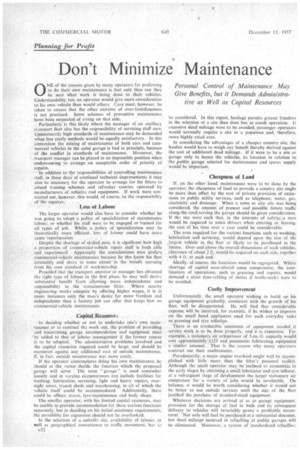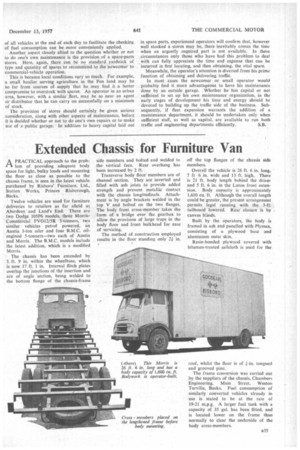Don't Minimize Maintenance
Page 74

Page 77

If you've noticed an error in this article please click here to report it so we can fix it.
Personal Control of Maintenance May Give Benefits, but it Demands Administrative as Well as Capital Resources
ONE of the reasons given by many operators for preferring to do their own maintenance is that only then can they be sure what work is being done to their vehicles. ,Understandably, too, an operator would give more consideration to his own vehicle than would others. Care must, however, be taken to ensure that the other extreme of over-fastidiousness is not practised. Some schemes of preventive maintenance have been suspected of erring on that side.
Particularly is this likely where the manager of an Ancillary tr,insport fleet also has the responsibility of servicing staff cars. Unnecessarily high standards of maintenance may be demanded whert less costly methods would be equally satisfactory. In this connection the mixing of maintenance of both ears and commercial vehicles in the same garage is bad in principle, because of the conflict in standards of maintenance. Moreover. the transport manager can be placed in an impossible position when endeavoming to arrange an acceptable order of priority of repairs. In addition to the responsibilities of controlling maintenance staff, in these day? of continual technical improvements it may also be necessary for the operator to arrange for his fitters to attend training schemes and refresher courses operated by manufacturers of .vehicle.3 and equipment. If work were contracted out, however, this would, of course, be the responsibility of the repairer, .
Loss if Labour
The larger operator would also have to consider whether he was going to adopt a policy of specialization of maintenance labour, or whether his staff were to be engaged or trained for all types of job. Whilst a policy of specialization may be theoretically more efficient. Ins; of labour could have more acute repercussions. , .
Despite the shortage of skilled men, it is significant how high a proportion of commercial-vehicle repair staff is both able and experienced Apparently the conscientious man prefers commercial-vehicle maintenance because he ean know his fleet intimately and share to some extent' in the benefit accruing from his own standard of workmanship.
Provided that the transport operator or manager has obtained the right type of labour in the first place, he may well derive substantial . benefit from allowing more independence and iesp6nsibility to the conscientious fitter. Where nearby engineering works compete by offering higher wages, it is in many instances only the man's desire for more freedom and independence than a factory job can offer that keeps him on commercial-vehicle maintenance.
Capital Resource
In deciding whether or not to undertake one's own maintenance or to contract the work out, the problem of providing and maintaining garage accommodation and equipment must he added to that of labour management if the former course is to be adopted. The administrative problems involved an41 the capital resources required could he large, and should be measured against any additional cost of outside maintenance. if, in fact, outside maintenance was more costly.
If the operator contemplates doing his own maintenance. he should at the outset decide the function which, the proposed garage will serve. The term garage" is used somewhat loosely and in varying ciicumstances can include facilities for Washing, lubrication, servicing, light and heavy repairs, overnight cover, cover, transit sheds and warehousing, in all of which the vehicle itself could be accommodated. Additionally, there could be offices. stores. tyre-maintenance and body shops.
The smaller operator, with his limited capital resources, may be unable to provide accommodation for these various functions separately, but in deciding on his initial minimum requirements, the poFsibility for expansion should not be overlooked.
In the selection of a suitable site. availability of labour, as well as geographical convenience to traffic movement, has to c32 be considered. In this aspect, haulage permits greater freedom in the selection ot a site than does bus or coach operation. If excessive dead mileage were to be avoided, passenger operators would normally require a site in a populous and, therefore, more highly rated area.
In considering the advantages of a cheaper country site, the haulier would have to weigh any benefit thereby derived against the cost of additional dead mileage. If it were to be a site or garage only to house the vehicles, its location in relation to the apublic garage selected for maintenance and spares supply would be important.
Cheapness of Land
If, on the other hand, maintenance were to be done by the operator, the cheapness of land to provide a country site might he more than offset by the cost of private provision of extensions to public utility services, such as telephone, water, gas. electricity and drainage. When a town or city site was being considered, the amount of present and possible future traffic along the road serving the garage should be given consideration. If the, site were such that, in the interests of safety, a man would be required to assist drivers when catering or leaving. the cost of his time over a year could be considerable.
The area required for the various functions such as washing. lubrication and servicing, would depend upon the size of the largest vehicle in the fleet or likely to be purchased in the future. Over and above the overall dimensions of such vehicles. clearance of about 2 ft. would be required on each side, together with 4 ft. at each end.
' Ideally, of course, the functions would be segregated. Where shortage of capital neee,sitated some compromise, the combination of operations, such as greasing and repairs, would demand a strict time-tabling of duties if bottle-necks were to be avoided.
Costly Improvement
Unfortunately, the small operatoc wishing to build up his garage equipment gradually, consistent with the growth of his fleet, will be disappointed. He will find that considerable expense will be incurred, for example, if he wishes to improve on the small hand appliances used for such eVeryday tasks as greasing and tyre inflation.
There is an irreducible minimum of equipment needed. if service work is to be done properly, and it is expensive. For example, a stationary air cempressor of 5-cu.-ft. capacity would, cost approximately:L.125 and pneumatic lubricating equipment a similar amount: That is the reason why many operators contract out their maintenance.
Paradoxically, a major engine overhAul might well be accomplished with little more than the fitter's personal toplkit. Although the small operator may be inclined to economize iii the early stages by obtaining a small lubricator and tyre inflator, at a subsequent stage of development the larger stationary air compressor for a variety of jobs would be invaluable. On balance, it would be worth considering whether it would not he better to use outside services until the size of the fleet justified the purchase of standard-sized equipment.
Whatever decisions are arrived at as to garage equipment, provision for the storage of fuel in bulk and its subsequent delivery to vehicles will invariably prove a profitable investment. Not only will fuel be purchased at a substantial discount. but dead mileage incurred in refuelling at public garages will be eliminated. Moreover, a system of standardized refuelline of all vehicles at the end of each day to facilitate the checking of fuel consumption can be more conveniently applied.
Another aspect closely allied to the question whether or not to do one's own maintenance is the provision of a spare-parts stores. Here, again, there can be no standard yardstick of type and quantity of spares to recommend to the newcomer to commercial-vehicle operation.
This is because local conditions vary so much. For example, a small haulier serving agriculture in the Fen land may be so far from sources of supply that he may find it a better compromise to overstock with spares. An operator in an urban area, however, with a similar fleet, may be so near an agent or distributor that he can carry on successfully on a minimum of stock.
The provision of stores should certainly be given serious consideration, along with other a.spects of maintenance, before it is decided whether or not to do one's own repairs or to make use of a public garage. In addition to heavy capital laid out
in spare parts, experienced operators will confirm that, however well stocked a stores may be, there inevitably comes the time when an urgently required part is not available. In these circumstances only those who have had this problem to deal with can fully appreciate the time and expense that can be incurred in first locating, and then obtaining, the vital spare.
Meanwhile, the operator's attention is diverted from his prime function of obtaining and delivering traffic.
In most cases the newcomer or small operator would probably find it more advantageous to have his maintenance done by an outside garage. Whether he has capital or not sufficient to set up his own maintenance organization, in the early stages of development his time and energy should be devoted to building up the traffic side of the business. Subsequently, if fleet expansion warrants the addition of a maintenance department, it should be undertaken only when sufficient staff, as well as capital, are available to run both traffic and engineering departments efficiently. S.B.




















































































































